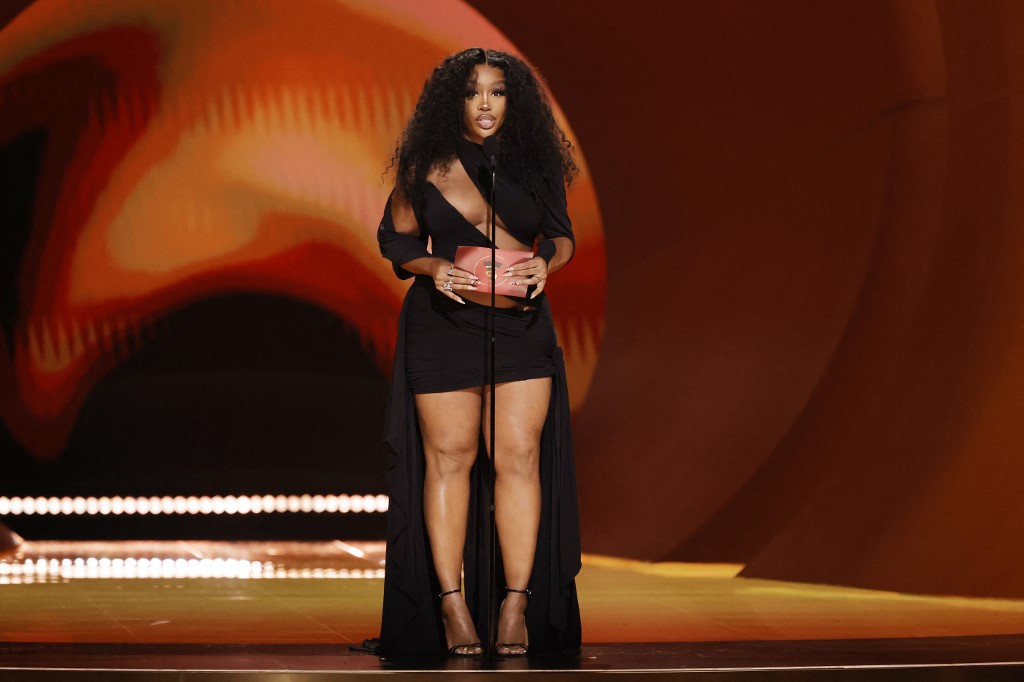
LOS ANGELES, CALIFORNIA – FEBRUARY 05: SZA speaks onstage during the 65th GRAMMY Awards at Crypto.com Arena on February 05, 2023 in Los Angeles, California. (Photo by KEVIN WINTER / GETTY IMAGES NORTH AMERICA / Getty Images via AFP)
LOS ANGELES, California — Musicians and critics alike have long accused Grammy voters of ignoring the work of female artists — but this year, it’s highly probable that women will take home the night’s top prizes.
At Sunday’s gala, seven of eight of nominees in the Album and Record of the Year categories are women or gender fluid, among them Taylor Swift, SZA and Olivia Rodrigo — a sea change many industry watchers see as long overdue.
“Women pop stars have gone from owning the red carpet discussion to owning the entire Grammys discussion,” said Kristin Lieb, a professor at Emerson University whose research focuses on entertainment marketing, music and gender.
“That’s a significant change,” Lieb told AFP. “The framing is becoming more about their talent and charisma than their bodies and outfits.”
Swift, SZA and Rodrigo snagged chances at Grammy gold in both the album and record categories, joined by Miley Cyrus and indie supergroup boygenius.
Janelle Monae and Lana Del Rey are also in the running for Album of the Year, while Billie Eilish and rising star Victoria Monet both nabbed top record nods.
And then there’s Jon Batiste, the decorated jazz polymath who dominated the ceremony two years ago — and is the sole man up for both awards.
Lieb noted the slate is impressive for its representation of women as well as its inclusion of people identifying as gender fluid or queer, including the members of boygenius, as well as Cyrus, Eilish and Monae.
It’s a significant shift statistically: from 2012-2022, the Annenberg Inclusion Initiative at the University of Southern California found that just 13.9 percent of nominees in major categories were women, and the rest were men.
At last year’s Grammys gala, half the nominees for Best New Artist were women, as were one-third of the contenders for Song of the Year, which honors songwriting.
But in Record and Album of the Year, it was just 15 and 12 percent, respectively.
Those statistics were particularly grim when paired with the now infamous words of former Recording Academy CEO Neil Portnow — who said that female artists who want recognition in a music industry that’s historically sidelined and demeaned them should “step up.”
Late last year, Portnow was sued for allegedly drugging and raping a woman artist in 2018.
– Sea change –
But the past year has been one of great strides, with notable historic highs on the Billboard top songs chart for women of color, according to the latest Annenberg numbers released this week.
Following November’s nominations reveal, the new Academy chief, Harvey Mason Jr, said simply “women had dang good music.”
“And our voters were obviously moved by a lot of it.”
Many of the women nominated are years deep into their careers and part of a field that is diverse in genre and style, in a world that traditionally lumps most famous female artists under the “pop” umbrella and shows them the door as they age.
“A woman, if she sells enough, will sort of lose her genre of origin and will be constructed as a pop star no matter what her background is,” Lieb said.
“And generally speaking, the way that has been interpreted is that pop is sort of synonymous with something that’s artificial or fleeting.”
Compare that to the average male musician, she said, who “will be constructed as an authentic, talented, genius artist.”
That framing simultaneously serves to diminish the talent and success of women who actually are pop-focused, casting them into a silo that’s often perceived as unserious.
Lieb is cautiously optimistic that change is afoot, industry-wise as well as in the worlds of critics and academics, saying: “Pop music can be art, it can be worthy of serious discussion. It can be worthy of thoughtfulness.”
And while the music industry’s male domination has meant a Grammy slate like the one this year is cause for celebration, scholar Christine Wisch said she hopes for a world “where we can really just look at the art on its own” without regard for “certain identities.”
A classically trained musicologist, Wisch teaches a survey course at Indiana University on women musicians across history, from the medieval era to modern times.
She said her students have voiced particular admiration for the band boygenius — a trio up for six awards — whose members routinely skewer the reductive label “women in rock.”
“As a musician and an educator, I look forward to when this isn’t a conversation,” Wisch said — “the day in which gender is not part of the conversation, when we’re not surprised that women are dominating this or that.”